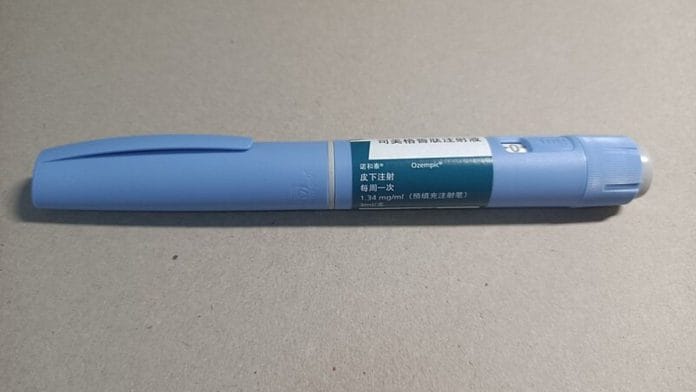New Delhi: Blockbuster diabetes and weight-loss drug semaglutide can significantly cut down the risk of adverse outcomes such as kidney failure, heart attacks, and death in patients with type 2 diabetes and chronic kidney disease, new research has found.
The study in The New England Journal of Medicine found that patients who received semaglutide once a week have a 24 percent lesser risk of their kidney disease worsening or prematurely dying from cardiovascular- or kidney-related causes than those who received the placebo.
The study, which included over 3,500 patients and involved follow-ups for up to over three years, showed that the once-a-week drug treatment reduced the risk of major cardiovascular events such as heart attacks by 18 percent and the risk of death from any cause by 20 percent.
“Semaglutide reduced the risk of clinically important kidney outcomes and death from cardiovascular causes in patients with type 2 diabetes and chronic kidney disease,” the researchers noted.
The study is more evidence of the benefits of semaglutide, an anti-diabetic medication by Danish drugmaker Novo Nordisk that has been phenomenally effective in shedding the pounds quickly.
Semaglutide contains a compound known as glucagon-like peptide-1 (GLP-1) receptor agonist, which mimics a naturally occurring gut hormone known to send signals of a full appetite to the brain.
The US Food and Drug Administrator (US FDA) has approved its two versions in injectable form — Wegovy (higher dose for weight loss) and Ozempic (lower dose for diabetes) — over the last few years.
In India, however, the drug is only available in oral form under the Rybelsus brand name, with indications for application in adults with diabetes mellitus. However, its high costs — a daily dose of one tablet costing over Rs 260 — has kept the drug out of reach for many.
However, some experts ThePrint spoke with said the new findings, which they called “huge”, would likely enhance its popularity among patients and doctors, especially in a country like India, which has a diabetes burden of nearly 101 million, making it the “diabetes capital of the world”.
Studies have also established that nearly 30-40 percent of diabetic people in India go on to develop chronic kidney disease complications.
“Despite recent advances in the treatment of diabetes and kidney disease, many patients with diabetic kidney disease continue to lose kidney function over the years,” said Dr Vaibhav Keskar, nephrologist and kidney transplant specialist with Fortis Hospital, Mumbai.
Keskar said the study offered hope and gave one more treatment option for physicians preventing and treating diabetic kidney disease.
The latest study comes a few months after an announcement by Novo Nordisk, saying that a 2.4 mg dose of the drug can reduce cardiovascular and related deaths by up to 20 percent.
Also read: ICMR seeks retraction of BHU study linking high rate of adverse health events with Covaxin
‘Wonder drug’ but comes with a word of caution
Semaglutide has quickly emerged as one of the world’s ‘wonder drugs’, along with another GLP-1 agonist, Eli Lilly & Company’s tirzepatide, available under brand names Mounjaro and Zepbound.
It’s because the drug, mimicking glucagon-like peptide-1, not only has shown benefits in reducing blood sugar levels by increasing insulin release from the pancreas but also slows down food passage through the stomach and demonstrates weight loss capabilities by signalling to the brain that the person’s stomach is full, said Dr Urmila Anandh, who heads the nephrology department at Amrita Hospital in Faridabad.
The latest study has further proved the drug’s effectiveness in slowing the progression of chronic kidney disease and reducing cardiac events and mortality in patients with diabetes and chronic kidney disease, which is significant, she said.
But others ThePrint spoke with underlined that while this is heartening news, and millions of people with diabetes are likely to have one more medicine to protect their kidneys, challenges do exist.
“Many patients do not tolerate the injections because of gastrointestinal adverse effects. Common gastrointestinal effects of semaglutide include abdominal pain, nausea, vomiting, diarrhoea, or constipation,” Keskar said.
(Edited by Madhurita Goswami)
Also read: Hormone therapy for menopausal women effective for discomfort, not chronic diseases, finds US study






